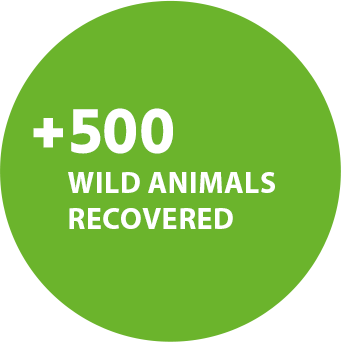


DID YOU KNOW THAT BRAZIL IS THE RECORD HOLDER IN THE TRAFFICKING OF WILD ANIMALS ?
In Brazil, every year, 38 million wild animals are taken from nature. Of every ten animals trafficked, only one survives. Around four million individuals are traded in the informal market in several Brazilian states, including Rio de Janeiro. Since 2014, the Wild Animal Care Sanctuary has become a reference in receiving victims seized by government agencies and environmental police, being the only institution of this nature in the state.
Wild animal trafficking, along with deforestation and indiscriminate occupation of forest areas, is responsible for the extinction of thousands of species and causes huge environmental imbalance, impacting not only forests, but also cities and rural areas.
WILDLIFE TRAFFICKING IN BRAZIL

More than 38 million DE
ANIMALS ARE TAKEN
FROM THEIR NATURAL HABITATS
PER YEAR

OF EVERY 10 TRAFFICKED
ONLY 1 SURVIVES AND NEEDS SHELTER

4 MILLION ANIMALS
ARE TRADED
ON THE INFORMAL MARKET

THIS PRACTICE IS RESPONSIBLE FOR THE EXTINCTION OF THOUSANDS OF SILVEST SPECIES
WE WERE BORN TO CARE
With the mission of sheltering wild animals that have been victims of mistreatment, the Wild Animal Care Sanctuary is a private non-profit organization that was born from the dream of its founder and General Director, Simone Duque.
“I have always had this passion for animals and I already took care of some wild animals here on the farm when I accepted the proposal, during an Ibama inspection, to found the Sanctuary with my own resources. Today, what we want is to expand the project so that more animals can arrive. We know that the demand is great and that we have the responsibility to maintain these lives.”

Simone Duque
Founder of the Animal Care Wild Sanctuary

OUR STORY
1992
Businesswoman Simone Duque finds two capuchin monkeys abandoned by a circus in a farm.
2012
Ibama's inspection team visited the farm where King, the little monkey rescued by the entrepreneur, started living with other abandoned wild animals that were delivered to her by local residents or that appeared in the surroundings of her land in search of food.
2013
The businesswoman is asking the competent bodies for permission to operate the wild animal keeper Associação de Proteção aos Animais Animal Care.
2014
Foundation of the Animal Care Wilderness Sanctuary.
2022
Expansion of protection areas for capuchin monkeys and agreement with Refauna project to release birds in Tijuca Forest, Rio de Janeiro.
THE DREAM OF RETURNING
TO NATURE
The mission of the Wild Sanctuary is to care for the lives of individuals that have been rescued from mistreatment by humans, animal trafficking, or irreversible domestication.
We work with the perspective of integrating the animals to their natural environment, especially the birds, whose health condition allows an in-situ rehabilitation process that rescues their self-preservation abilities such as autonomy for hunting or food gathering and mobility.

ENVIRONMENTAL ENRICHMENT
The Wild Sanctuary Animal Care team uses Environmental Enrichment techniques, introducing to the animals' routine varied activities through objects and toys, promoting games and other forms of stimulation to keep them active and happy.
Enrichment awakens the animal's instincts in a safe, spacious, and quiet environment so that they don't feel confined.
A varied diet that is available more than once a day is also a welfare factor for the animal.
In the sanctuary, a "playground" was built for the primates to interact. The playground occupies an area of 20 meters by 10 meters.
The keepers take each individual or group to the activities. It is a time when they feel freer to develop their natural instincts.
Playtime always takes place before meals, while the enclosures are sanitized. The monkeys are taken to the play area, where they wait for the keepers to finish cleaning, while they have fun. After the cleaning, they return to their enclosures to eat.
Nos ajude a
salvar vidas
Você pode ajudar de várias formas além
da doação em dinheiro. Junte-se a nós e
transforme vidas.